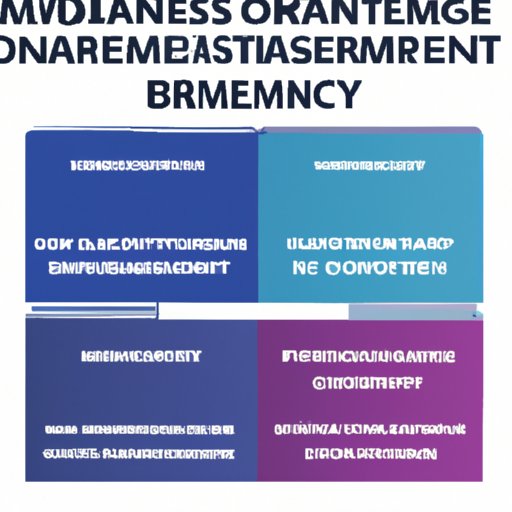Introduction
A business management degree is an academic program that provides students with the skills and knowledge necessary to succeed in a variety of corporate, nonprofit, and government organizations. Business management degrees are offered at both undergraduate and graduate levels, and they cover topics such as accounting, finance, marketing, economics, and human resources. These programs also provide students with the opportunity to develop communication and problem-solving skills, which are essential for success in any business setting.

Exploring the Benefits of a Business Management Degree
One of the main benefits of earning a business management degree is that it provides students with a comprehensive understanding of the principles of business. Students will learn about the various components of running a successful business, including accounting, finance, marketing, economics, and human resources. In addition, they will gain valuable problem-solving and communication skills that will help them excel in their chosen field.
Business management degrees also offer students the opportunity to develop their understanding of the global economy and how businesses operate within it. Students will learn about the different economic systems in place around the world, and how each system affects the way businesses operate. They will also gain an appreciation for the importance of international trade and its impact on the global economy.
In addition, business management degrees give students the opportunity to hone their decision-making and leadership skills. Through courses in economics, accounting, and marketing, students will gain a deeper understanding of the decisions that need to be made in order to run a successful business. They will also learn how to effectively lead teams and manage projects, which are essential skills in any business setting.
What You Can Do With a Business Management Degree
A business management degree can open the door to a wide range of career opportunities in corporate, nonprofit, and government organizations. Potential careers include operations management, human resources, marketing, finance, and accounting. Those with a business management degree may also find themselves working in the banking or insurance industries, or in consulting and research roles.
Those with a business management degree may also pursue entrepreneurship. The knowledge and skills gained from a business management program can be invaluable when launching a new business. Having a thorough understanding of the principles of business can help entrepreneurs make informed decisions and develop effective strategies for success.
According to a study conducted by the National Center for Education Statistics, “those with a business management degree earn significantly higher salaries than those without one.” This can be attributed to the fact that employers value the knowledge and skills that come with having a business degree.
A Comprehensive Guide to Business Management Degrees
When considering whether to pursue a business management degree, it is important to understand the different types of degrees available, as well as the admissions requirements, coursework, and program length. Below is a comprehensive guide to help you make an informed decision.
Different Types of Business Management Degrees
The most common type of business management degree is the Bachelor of Science in Business Administration (BSBA). This degree is typically earned after completing four years of full-time study and typically requires 120 credit hours. Other popular business management degrees include the Master of Business Administration (MBA) and the Doctor of Business Administration (DBA). Both of these degrees are typically earned after completing two to three years of full-time study and typically require 60 to 90 credit hours.
Admissions Requirements
Admission requirements vary depending on the school and program, but generally speaking, students must have a high school diploma or equivalent in order to apply. Some schools may also require applicants to submit standardized test scores, such as the SAT or ACT. Additionally, some programs may require applicants to submit letters of recommendation or a personal statement.
Coursework and Program Length
The coursework for a business management degree varies depending on the school and program. Generally speaking, courses will cover topics such as accounting, finance, marketing, economics, and human resources. Additionally, some programs may offer specialized courses in areas such as data analysis, project management, organizational behavior, and strategic planning. Most business management degrees take two to four years to complete, depending on the program and the student’s academic progress.

What to Expect in a Business Management Program
Most business management programs consist of core courses, specializations, and internships or other experiential learning opportunities. Core courses typically cover topics such as accounting, finance, marketing, economics, and human resources. Specializations allow students to focus their studies in a particular area, such as operations management, human resources, marketing, finance, or accounting. Lastly, internships or other experiential learning opportunities allow students to gain real-world experience in a business setting.

An Overview of the Different Types of Business Management Degrees
Bachelor’s degrees: Bachelor of Science in Business Administration (BSBA), Bachelor of Business Administration (BBA), Bachelor of Arts in Business Administration (BABA)
Master’s degrees: Master of Business Administration (MBA), Master of Science in Business Administration (MSBA), Master of Arts in Business Administration (MABA)
Doctoral degrees: Doctor of Business Administration (DBA), Doctor of Philosophy in Business Administration (PhDBA), Doctor of Business Leadership (DBL)
Conclusion
A business management degree can provide the knowledge and skills necessary to succeed in a variety of corporate, nonprofit, and government organizations. This comprehensive guide explored the different types of business management degrees, admissions requirements, core courses, specializations, and experiential learning opportunities. Whether you’re looking to enhance your current career or embark on a new one, a business management degree can be a great investment in your future.
(Note: Is this article not meeting your expectations? Do you have knowledge or insights to share? Unlock new opportunities and expand your reach by joining our authors team. Click Registration to join us and share your expertise with our readers.)
